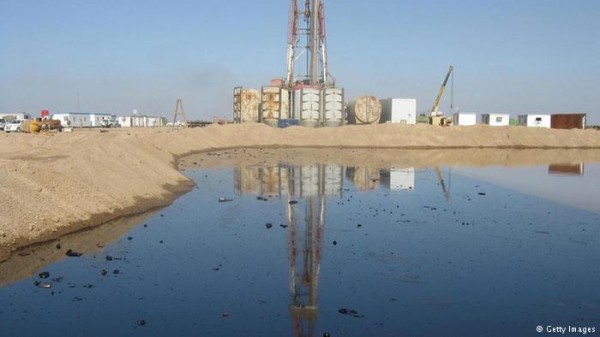The new Iraq crisis is much more threatening for China than it is for the United States, says DW columnist Frank Sieren. In recent years, Beijing invested heavily in Iraq and depends on the country’s oil.
So far, China could be congratulated for its position on Iraq. Beijing won the Iraq war without sending a single soldier to the country. The United States, on the other hand, dug itself a hole in the ground it could never climb out of. Nearly 4,500 US soldiers were killed in the most recent Iraq War, and that number comes in addition to more than 100,000 civilians. The war cost some $79 billion and has yet to pay any dividends.
China controls Iraqi oil production
Despite what many people assume, American companies are not the proud new owners of Iraqi oilfields, as former US President George W. Bush had hoped. After US troops entered Iraq and pulled former dictator Saddam Hussein from his own hole in the ground eight months later, everything developed differently than expected. PetroChina was the first foreign firm to get an oil drilling license after the fall of Saddam Hussein.
Then, Chinese companies grabbed up drilling rights for one oil field after another from US corporations – and got considerably better deals while doing it. The Chinese, in the meantime, have come to control some 50 percent of oil production in Iraq. The Rumaila, Halfaya and West Qurna oil fields, by far the largest in Iraq, are controlled by either Chinese companies or joint ventures with Chinese companies, rather than US firms.
The democratically elected Iraqi government simply could not afford to make concessions due to the anti-American mood in the country. So the Americans ended up waiting in vain for the Iraqi government to reciprocate after the world’s super power put it in a position to win the election. Disappointed, Washington withdrew from the Iraqi oil business at the end of 2011 and left the Chinese, who could offer better conditions. China has become the largest investor in Iraq and buys 80 percent of all Iraqi oil.
ISIS advance is making Beijing nervous
Now that ISIS troops are marching on Baghdad, having raised their black flags in many cities and introducing Sharia courts along the way, Beijing is getting nervous. The oilfields operated by the Chinese in the south of the country may still be far away from the ISIS troops’ area of influence, but the jihadists’ blitzkrieg has already affected China’s oil business. Last week, the insurgents had already brought the country’s largest oil refinery in the city of Baiji under their control. The oil fields in the south were then forced to curb production because there was less demand for oil.
ISIS fighters have also recognized the strategic significance of the oilfields and refineries; after all, the caliphate they dream of and hope to erect where Syria and Iraq officially draw their borders cannot survive on praying to Mecca five times a day.
As confusing as the current situation may be, it is highly unlikely Chinese firms will be producing oil without any problems over the next few months or years in Iraq. There isn’t much even the 300 new US military advisers can do if Iraq’s President Nouri al-Maliki continues to exclude Sunnis and Kurds. At present, political alternatives are not in sight. And Washington doesn’t want to be drawn into a ground war once again.
So the Chinese have reason to worry. They can absorb short term production losses, but in the long run they need Iraqi oil. They will need 800 million tons of oil per year by 2030. Two-thirds of that will have to be imported.
Non-interference policies in doubt
In that respect, the practicality of Chinese foreign policies is debatable. On Sunday (22.06.), Wang Yong, China’s Ambassador to Iraq, passed on to the Iraqi government a message from Beijing to the effect that China would support the Iraqi government’s measures to “restore security in the country” and “regain control” of several Iraqi cities. In turn, a representative of the Iraqi government would have to promise that the government would do its best to guarantee the “safety of the members of the embassy and its foreign national employees.” About 10,000 Chinese work in Iraq – not enough to protect Chinese interests.
The big question in the coming years will be whether the strategy of concentrating on business and staying out of a country’s domestic issues functions if you’re dealing with religious fanatics. That’s true, not only for Iraq, but also Libya, and most of all for Afghanistan, where Beijing will in future not only have to deal with the government, but the Taliban as well.
China, US agree on objective
The situation in Iraq, however, is much more complex: al-Maliki is backed not only by the US, but also by Iran, whose closest ally is China. Al-Maliki’s opponents, the Syrian jihadists, were co-financed by Arab oil and gas oligarchs. Here, too, Beijing has close ties. In May, Beijing and Saudi Arabia agreed on a contract on the shipment of Chinese drones. The US has already pledged to equip the Iraqi military with ScanEagle drones. It’s very likely that US and Chinese drones will be pitted against each other in Iraq for the first time – although both suppliers have the same goal: a predictable and stable Iraq.
Our correspondent Frank Sieren is considered one of the leading German experts on China. He has lived in Beijing for the past 20 years.







